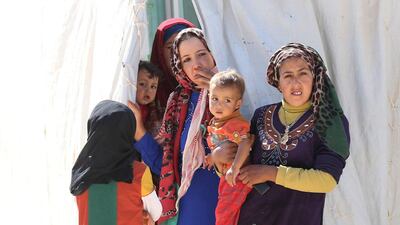As the only male in the household due to an absent father, the temptation to leave school and earn money to help support his mother and three sisters is overwhelming for 14-year-old Khaled Barghash.
It has been a constant battle for his mother Amal Hoshan, 47, to keep him engaged in school work as he watches friends earn a living, even if it is just JD2 (AED10) per day. The teenager says he would not hesitate to find work to support his family, who live in Zaatari refugee camp in the north of Jordan, if necessary.
Now, almost four weeks into a country-wide lockdown in Jordan, which has forced children to study at home, keeping Khaled focused on his education has become an even greater battle.
Country representative of Unicef Jordan, Tanya Chapuisat said the lockdown presents an increased risk to children’s welfare in the country, both in terms of domestic violence and the threat of coronavirus, and the longer-term impact on access to education.
“Clearly the most vulnerable children are the hardest to reach and to bring back to education. The longer children stay out of school, the higher the likelihood they remain out,” said Ms Chapuisat.
Khaled's family has lived in Zaatari since 2013. Before the lockdown Ms Hoshan earned JD50 a month coaching a girls’ football team in the camp. For the last few weeks, she has had to rely on food coupons to keep her family going, living off the basics of rice, lentils and pasta.
The biggest challenge has been to keep her children inside the home and focussed. “The television school lessons have made it much easier because it keeps them occupied, and I try my best to keep them entertained,” she says.
“I’m particularly worried I won’t be able to keep Khaled motivated and I’m concerned he won’t want to return to school.”
The number of child labourers aged five to 17 in Jordan roughly doubled to more than 69,000 between 2007 and 2016, with around 44,000 engaged in hazardous work, according to the National Child Labour Survey. Approximately 80 percent of child labourers are Jordanian and about 15 percent are Syrian.
Khaled attends a school in the camp, and also spends time at a centre where he focuses on his English, Arabic and maths. Ms Hoshan and her daughters try their best to convince him of the importance of getting an education but the camp offers fertile ground for child labour and Khaled is set on providing for the family. Ms Hoshan is using the little money she has left to pay for an internet connection to ensure her children have access to e-learning.
For single mother Hala Imran, 37, who lives near Zarqa, a city 30km from Amman, the situation is desperate.
"I'm very worried about my children's education. I haven't been able to set up the television channels for the lessons and I don't have money for internet. I don't even have money for food – I've had to feed my children mouldy bread," the Jordanian mother-of-five told The National.
She receives JD70 per month from the National Aid Fund but she says it is not enough, especially now the children are no longer attending school. She has previously been forced to send her eight-year-old son to sell socks on the street and she fears this will have to continue.
“I’m worried my children will get behind with their schoolwork and then I won’t have the money to afford catch-up classes for them,” Ms Imran says.
Unicef has been working with the government and local partners to supply necessities, offer advice on staying safe and support e-learning by providing computers and teacher training.
“I think as families get poorer the risk of child labour increases, but that’s why organisations are looking to top up people’s cash. It takes a while to bring kids back to education and if you’re talking about longer periods then you do end up with a drop-out rate,” she said.
“We are launching catch-up programmes following the lockdown.”
About 70 percent of children in Jordan have access to online learning, according to the Ministry of Education, but the majority in the camps struggle to afford sufficient internet access.
A study conducted by Relief International in Zaatari camp showed three out of four households have access to internet but about 90 percent of people run out of data before end of month.
“There are also the gender pressures; now families are at home the girls have to help out with children and housekeeping – those gender pressures come back,” said Ms Chapuisat.
There are also concerns the lockdown will lead to an increase in violence towards children.
The Population and Family Health Survey 2017-2018 showed 81 percent of children in Jordan aged between one and 14-years-old were subjected to violent methods of discipline during the month preceding the study.
“I would assume that as the pressure increases [under lockdown] there is a greater risk of children being physically abused, but we don’t have the numbers to back that up. Coming out of lockdown we’ll have more safe houses and we will beef up capacity,” said Ms Chapuisat.
Unicef has been given a limited number of permits for staff to move around during lockdown, she said, which has changed to way it operates for the moment and has made it more difficult to reach people to monitor welfare. It has launched a new $17 million appeal as part of its focus on getting cash to those most in need, as well as supplying printed school material for families who don’t have internet access in the hopes it will keep more children in education.




















